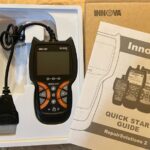Mileage verification is crucial for various industries, from auto insurance and repair to road usage charging. While OBD2 scanners are often touted as a solution for tracking vehicle mileage, especially with the rise of user-friendly apps and devices, it’s important to understand their limitations. For businesses and individuals seeking precise and reliable mileage data, it’s essential to question if an Obd2 Scanner That Reads Mileage is truly the best approach. Are these devices accurate, convenient, and secure, or are there better alternatives available?
The Limitations of OBD2 Scanners for Mileage Reading
OBD2 (On-Board Diagnostics 2nd Generation) scanners were initially designed for vehicle diagnostics, allowing mechanics and car enthusiasts to monitor engine performance and troubleshoot issues. While some OBD2 scanners advertise the ability to read mileage, it’s critical to understand how they operate and why they might not be the optimal choice for accurate mileage verification, particularly at scale.
Inaccurate Mileage Data: Estimation vs. Odometer Reading
One of the most significant drawbacks of relying on an OBD2 scanner to read mileage is its inherent inaccuracy. Contrary to popular belief, most OBD2 scanners do not directly access a vehicle’s true odometer reading. Instead, they estimate mileage based on various parameters like GPS location, speed, and trip duration.
This estimation method is prone to errors. Small discrepancies in location tracking or trip start/end detection can accumulate, leading to significant inaccuracies over time. For applications like usage-based insurance or precise maintenance scheduling, these inaccuracies can result in flawed risk assessments and incorrect service recommendations. Furthermore, the reliability of mileage data can be inconsistent across different OBD2 scanner brands and models, making it challenging to standardize data collection.
Practical Inconveniences and Potential for Failure
Beyond accuracy concerns, OBD2 scanners present practical challenges. Installation, while often marketed as simple, can still be an inconvenience for the average driver. It requires physical installation of a device into the OBD2 port, which may not be easily accessible in all vehicles. Drivers need to wait for the device to be shipped, locate the port, and ensure proper installation.
Even when correctly installed, OBD2 dongles are susceptible to unintentional failure. A loose connection, accidental bumps, or even vibrations from driving can dislodge the device, interrupting data collection without the driver’s immediate knowledge. This unreliability poses a significant problem for businesses depending on consistent mileage data, as gaps in data can lead to inaccurate billing, policy management issues, or flawed service reminders.
Software Integration and Compatibility Hurdles
Integrating data from OBD2 scanners into existing business systems can also be complex. Many OBD2 devices operate on separate platforms, requiring additional effort to synchronize mileage data with insurance policy management systems, repair shop software, or road usage charge billing platforms. This lack of seamless integration can increase administrative overhead and reduce operational efficiency.
Vulnerability to Tampering and Privacy Concerns
While unintentional failures are a concern, intentional tampering is another serious issue. Drivers seeking to underreport mileage for insurance fraud or other reasons can easily unplug an OBD2 dongle, rendering it ineffective without detection. This vulnerability to manipulation undermines the reliability of OBD2 scanners for mileage verification, especially in applications where financial transactions are involved.
Furthermore, OBD2 scanners raise privacy concerns. These devices often collect a range of vehicle data, and users may be unclear about exactly what information is being tracked, how it’s being used, and who has access to it. In an era of heightened data privacy awareness, this lack of transparency can be a significant deterrent for drivers and create challenges for businesses seeking to build trust with their customers.
Costly Hardware and Ongoing Expenses
Finally, the cost associated with OBD2 scanners should not be overlooked. Businesses deploying OBD2 solutions must bear the expenses of purchasing hardware, shipping devices to customers, and managing replacements for lost or damaged units. Refurbished devices may offer some cost savings, but ongoing subscription fees per vehicle and logistical costs for distribution and returns add to the overall financial burden. For large-scale deployments, these expenses can quickly escalate, making OBD2 scanners a less cost-effective solution compared to software-based alternatives.
Connected Car APIs: A Modern Alternative for Mileage Verification
In contrast to the limitations of OBD2 scanners, connected car APIs offer a more accurate, convenient, and efficient approach to mileage verification. Platforms like Smartcar provide a software-based solution that directly accesses vehicle data with user consent, eliminating the need for hardware and addressing many of the shortcomings of OBD2 devices.
Superior Accuracy: Connected car APIs retrieve the actual odometer reading directly from the vehicle’s computer, ensuring precise and reliable mileage data without estimations or approximations.
Effortless User Experience: Onboarding with connected car APIs is streamlined and user-friendly. Customers simply grant permission through their car account login, eliminating the need for hardware installation or physical devices.
Enhanced Reliability and Security: API-based solutions provide consistent and tamper-proof data access. Mileage records cannot be manipulated by drivers, ensuring data integrity and reducing the risk of fraud.
Privacy-Focused Approach: Connected car APIs prioritize user privacy through consent-based data access. Customers are fully informed about the data being accessed and retain control over their data permissions.
Cost-Effective and Scalable: Software-based API solutions offer a predictable SaaS pricing model that scales efficiently with business needs. They eliminate hardware costs, shipping expenses, and logistical complexities associated with OBD2 devices.
Conclusion: Choosing the Right Tool for Mileage Verification
While OBD2 scanners that read mileage might seem like a readily available solution, their limitations in accuracy, reliability, convenience, privacy, and cost make them less than ideal for businesses requiring robust mileage verification, especially at scale. Connected car APIs offer a compelling alternative, providing a modern, software-driven approach that overcomes the drawbacks of OBD2 devices. For businesses seeking precise, reliable, and user-friendly mileage data, exploring connected car APIs is a strategic step towards optimizing operations and building trust with customers.
If you are interested in learning more about how connected car APIs can revolutionize your mileage verification processes, request a demo today and discover the future of vehicle data access.

